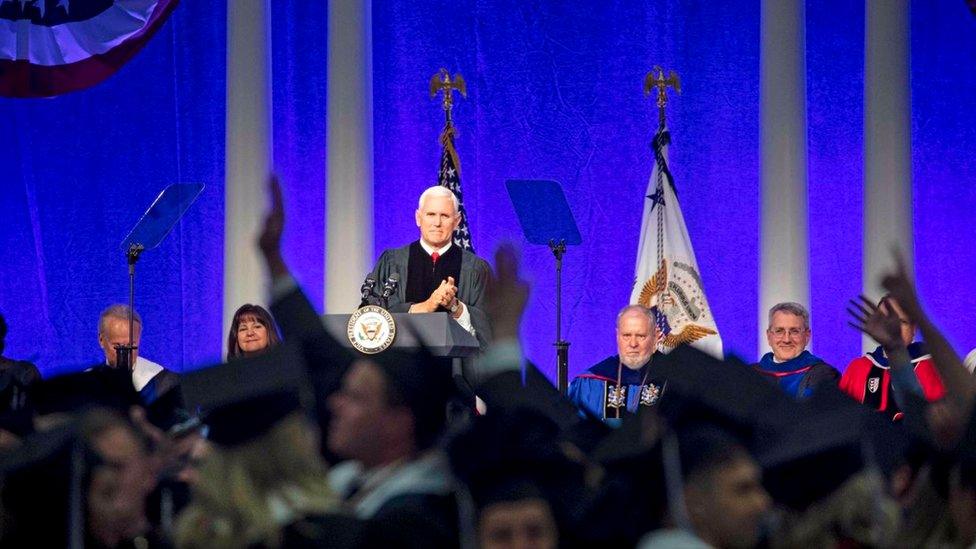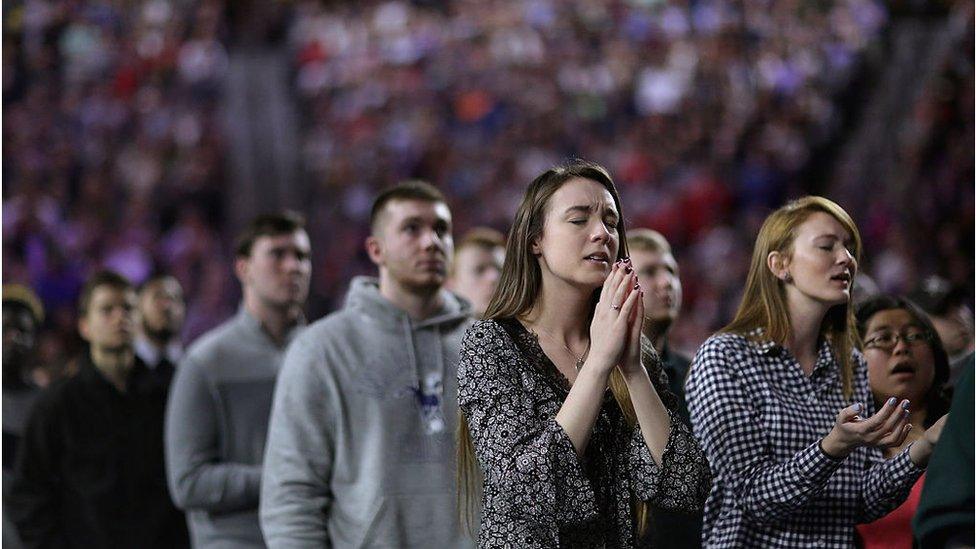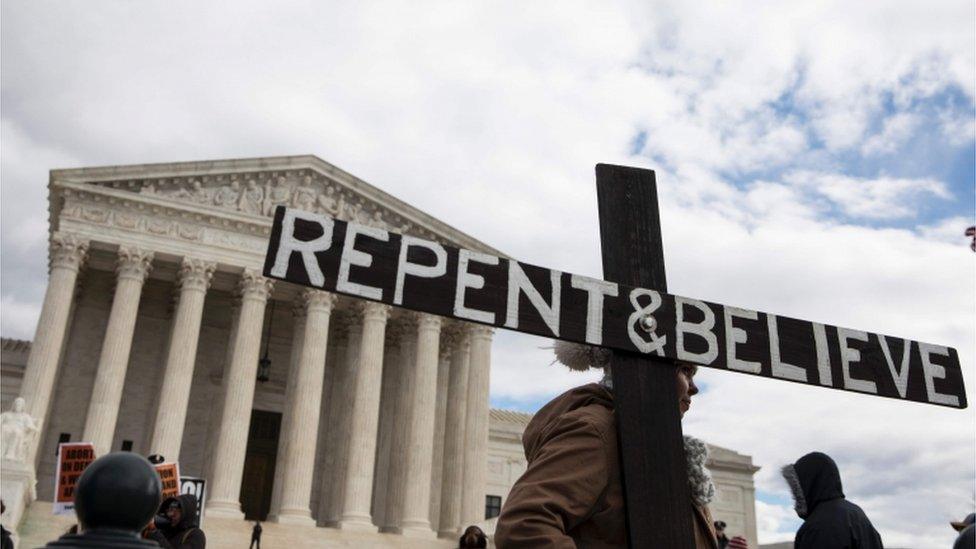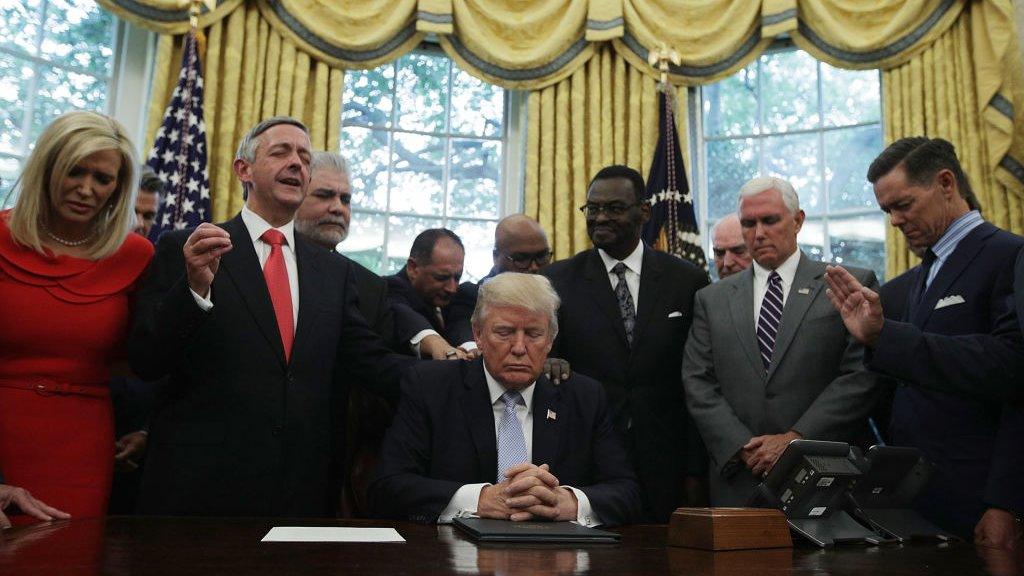Do more people believe in God in Trump's America?
- Published

Mr Pence, who identifies as an evangelical Christian, addressed the new graduates of Hillsdale College, a conservative college in Michigan
US Vice-President Mike Pence has said "faith in America is rising once again" - thanks to President Donald Trump. America's religious climate has shifted in recent years, but has it been in the direction Mr Pence suggests?
What did Pence say?
"Faith in America is rising again because President Trump and our entire administration have been advancing the very principles that you learned here in the halls of Hillsdale College," he told a crowd at a Christian conservative campus in Michigan on Saturday.
Allow X content?
This article contains content provided by X. We ask for your permission before anything is loaded, as they may be using cookies and other technologies. You may want to read X’s cookie policy, external and privacy policy, external before accepting. To view this content choose ‘accept and continue’.
"In fact, the percentage of Americans who live out their religion on a weekly basis - praying, going to church, reading and believing in the Bible - has remained remarkably consistent over the decades, even as the population of the United States has grown by leaps and bounds."
The vice-president also claimed that "relative to the population, four times as many Americans go to church on a regular basis than at the time of our nation's founding".
What do the numbers say?
According to Greg Smith, associate director for religion research at the Pew Research Center, Mr Pence's claims do not appear follow the numbers.
"The data we do have do not suggest a recent increase in the share of Americans who are highly religious," Mr Smith told the BBC.
"The vast majority of Americans do say they believe in God, but those numbers are ticking downward," he added.
As for Mr Pence's suggestion that more Americans are going to church in modern times? Aside from sheer population differences from 1776 to now, the figures do not support that claim either, according to Mr Smith.
"We've begun to see in recent years smaller but noticeable declines in the share of Americans who say they believe in God, who say religion is important to them in their personal lives, who say they pray every day and we've seen declines in the share of Americans who say they attend religious services regularly," he said.
A 2017 study published in Sociological Science, external showed that those who are intensely religious are still going to church consistently and frequently, but once-a-week attendance is dropping.
Mr Smith also noted the data shows the number of Americans identifying as atheist, agnostic or nothing in particular is "growing very, very rapidly".
"The share of Americans who identify with Christianity is declining because the share of Americans who identify with no religion is growing," Mr Smith said.

When Mr Trump spoke at Liberty University, a Christian university in Virginia, thousands of students prayed and praised the then-candidate
A 2017 study by the Public Religion Research Institute, external also tracked a diminishing white Christian presence across the US.
In 1996, 65% of Americans identified as white Christians. Over the last decade, that number has dropped to 43%.
What has the Trump administration done for Christian conservatives?
Mr Trump has been popular among Christian conservatives, particularly after choosing Mr Pence, an evangelical Christian, as his vice-president.
He has held to some of his campaign promises, such as appointing a high number of conservative judges - most notably, Neil Gorsuch to the Supreme Court.
In January last year, Mr Trump reinstated a 1984 policy banning international groups which perform or provide information on abortions from receiving federal money.

Pro-life supporters protested outside the US Supreme Court in Washington, DC during the March for Life in 2017
On Monday, the Trump administration delivered on another promise made to evangelical Christians during the campaign: recognising Jerusalem as Israel's capital.
For some evangelical Christians, the support for Israel comes from passages in the Bible they believe show that God intended Israel for the Jewish people.
How much impact has Trump had on religious communities?
Despite some wins for Christian conservatives, the Trump administration has not fulfilled promises to ban late-term abortions, defund Planned Parenthood or repeal the Johnson Amendment - a provision prohibiting non-profit charities like churches from endorsing political candidates.
For Casper ter Kuile, Ministry Innovation Fellow at the Harvard Divinity School, the impact of this administration on religion in America depends on how we define faith.
"Vice-President Pence is correct in asserting a widespread belief in God or a higher power - nine out of ten Americans agree with that," Mr ter Kuile told the BBC.
"But Pence is one of only 56% of Americans who believe in a traditional conservative God of the Bible.
"The number of Americans with that kind of faith is plummeting.
"More than one in three millennials are now religiously unaffiliated. On average 3,500 churches close every year in America."
- Published8 April 2018

- Published16 October 2017